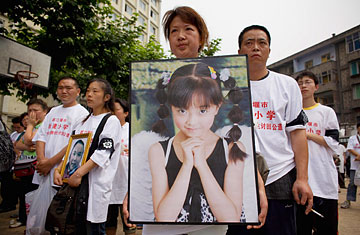
Parents of students killed in the May 12 earthquake hold portraits of their lost loved ones during Children's Day on June 1, 2008, in Dujiangyan, Sichuan province, China
As she has nearly every day since the May 12 earthquake that devastated China's Sichuan province, Liu Li came to the site again where her 15-year-old daughter perished. Today was different, though. As a lone bulldozer slowly worked to clear the rubble from the collapsed Juyuan Middle School, Liu stood in silent protest, along with nine other parents who also lost their only children when the schoolhouse crumbled in the quake. For more than an hour, as tears streamed down her face, Liu, 40, displayed a large photograph of Hui Shan, her daughter. It was a mock magazine cover, done up by the grieving mother and some of her friends in an art class. The photo showed the dead girl wearing stylish black glasses and an impish smile. "Sophisticated," the magazine's title read, just above the photo. Liu's vigil, and those of the other parents present, turned what is supposed to be a national holiday of celebration and games for kids into one of mournful — and pointed — remembrance. Children's Day, June 1, had come to Dujiangyan.
This small, impoverished town 37 miles (60 km) north of Chengdu, the capital of Sichuan province, has become the focal point of anguish over what Chinese now call "tofu schools," nearly 7,000 schoolhouses that collapsed in the quake while other buildings around them remained standing. The government says that nearly 300 children were killed in the Juyuan Middle School alone, and the anger of the parents of the victims is not diminishing, even though this past week the government reiterated its promises to investigate what happened and to include parents on a panel that will oversee the inquiry. Parents say they might hire lawyers to help them seek restitution — to get what a sign on a building next to the Juyuan school site calls "payment of the blood debt" from those who constructed the concrete building in 1988. "We're thinking very seriously of trying to get legal assistance," said one parent, who asked that his name not be used. "We're not convinced the government is serious about this." Asked if he or anyone else had actually contacted a lawyer yet, however, the father said no.
The anger in Dujiangyan presents the Chinese government with a difficult balancing act. Authorities are sympathetic toward parents and are trying not to be too heavy handed. But officials are also plainly concerned that protests could get out of control. On Children's Day, there was a huge increase in the number of uniformed policemen in Dujiangyan. At the collapsed middle school, the police didn't prevent parents from gathering and talking to reporters. Uniformed and plainclothes security officials snapped photographs of parents who spoke to journalists.
This is standard procedure for China's public security bureau in sensitive situations. More telling was that another Children's Day celebration planned for a Dujiangyan primary school not far from Juyuan Middle School was canceled. As young girls and boys walked to the school's entrance before 8 a.m., they were greeted by a sign at the front gate that said because of concerns about the safety of parents and their children, festivities would not take place. Instead, those who showed up were given pamphlets explaining that hygiene was very important after an earthquake. Wu Xia, a mother who came with her 11-year-old daughter, said the explanation "seemed strange" because children currently attend classes for three hours a day in tents set up just outside the school, which was damaged but remained standing. "I don't understand why they had to cancel today," she says. The likelihood is that the government decided to minimize the number of large public gatherings in the town.
Nor are authorities likely to be pleased by the muttering among parents about bringing in lawyers. After the quake, some government officials have been, by Chinese standards, remarkably candid. Lin Qiang, vice inspector of the Sichuan provincial education department, told Chinese news service Xinhua "If we educational officials hadn't left loopholes for corruption, the collapsed buildings could have been as solid [as those that remained standing]." He added that "Seeking truth is more important than losing face." Such sentiments, one Chinese lawyer told TIME, "all but invite the parents to keep pressing on this issue, to do whatever they can to seek justice. There is nothing in Chinese law that says they can't bring a lawsuit seeking compensation if they can prove corruption."
The reality, though, is that the parents of Dujiangyan are unlikely to prevail. Sophie Richardson, a Human Rights Watch lawyer specializing in legal reform in China, says that the government has refused to renew the licenses of two prominent civil rights lawyers who offered to represent Tibetans in the wake of the violence in the Tibet Autonomous Region in March. "They don't allow politically sensitive cases to get anywhere," Richardson says. "I'd be very surprised if this turns out to be different." Liu Li says she just wants to know why her daughter's school turned into a death trap. She, like the other parents holding photos of their dead children on Children's Day in Dujiangyan, await an answer. It probably won't come from a lawsuit.
